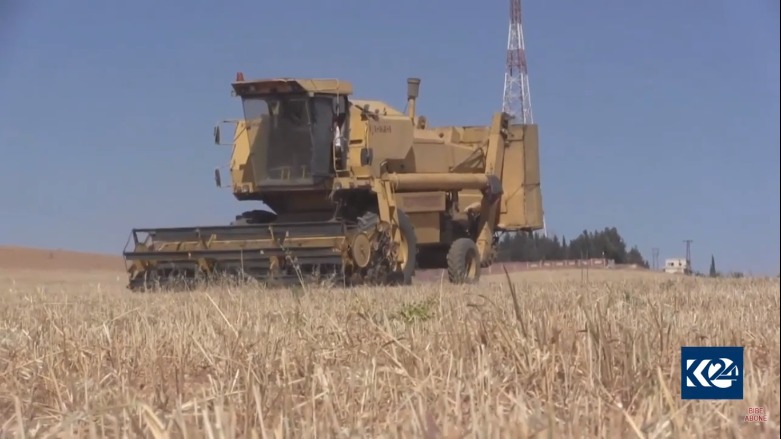Increasing alarm over water scarcity and food security in northeast Syria

ERBIL (Kurdistan 24) – Diplomats, UN officials and humanitarian organizations are increasingly alarmed by water scarcity and drought conditions in northeastern Syria, warning that it could negatively affect agriculture and food security.
Food insecurity
Mark Lowcock, the United Nations Under-Secretary-General for Humanitarian Affairs, warned UN member states on Wednesday that “if this year’s crops fail, food insecurity – which, as you know, is already at historic highs – will deteriorate further.”
The northeast was previously responsible for 70 percent of Syria’s wheat and barley production, he added.
Farmers in Kobani have called on the Autonomous Administration of North and East Syria (AANES) to provide more support and irrigation projects after the failure of this year’s crop due to the lack of rain and water from the Euphrates river.
“The administration needs to provide us support,” one local farmer warned in an interview with Kurdistan 24.
AANES officials have blamed Turkey for reducing water flows to the Euphrates river, which caused electricity blackouts and water scarcity in northeast Syria.
Need for More Water
Preventing a shutdown of the Tishreen and Tabqa dams requires dams in Turkey to release a minimum of 500 square meters of water per second, Lowcock said. But he also acknowledged that Turkey has been experiencing water shortages of its own.
"So we would urge all concerned to find a solution that sustainably addresses the needs of everyone in the region who depends on water from the Euphrates.”
Moreover, he said, there have been reports that in the last few days the amount of water released downstream has increased. “And I think that demonstrates that a solution to this set of problems can indeed be found.”
However, the Rojava Information Center (RIC) on Tuesday, denied media reports that Turkey is again releasing water into northeastern Syria after US mediation.
“This is untrue. AANES's economic department and an official at Tabqa dam both confirmed that water levels are unchanged and no agreement exists,” the Syria-based group said.
An alliance of NGOS called the NES Forum earlier warned that reduced water flows from Turkey could leave 5.4 million people with no alternative sources of drinking water.
“In addition to the water pumping stations, some three million people would lose their electricity if the dams shut down, as would hospitals and other vital infrastructure across the northeast,” the Lowcock warned.
Alouk Station
Lowcock also said technical teams are not granted regular access to the water station in Alouk in Hasakah province, which hampers water supplies to the province and al-Hol camp.
“On 23 May, technical teams secured one-off access to repair a sudden pipeline leak, but they are still not being granted regular and consistent access to the station,” he said.
The Alouk water station is near the border town of Ras al-Ain (Serekaniye), which Turkey and its militant proxies took over in October 2019 during Ankara’s Peace Spring Operation.
Since then, Turkey-backed groups have regularly cut the water flow from the facility, affecting an estimated 500,000 people in Hasakah city and nearby communities. Turkey has denied it was responsible for the cuts.
Need for Political Solutions
Wim Zwijnenburg, a senior researcher at PAX, a Dutch peace organization, welcomed the UN’s recognition that the water stress in northeast Syria “is posing direct and long-term environmental security risks for Syrian civilians.”
“These concerns over lowering water levels in Syria's lack due to lack of rainfall and diminishing release of water from the Euphrates basin in Turkey should be cause for political action to find a regional solution on the water crisis,” he told Kurdistan 24.
“This problem will only worsen in the future due to the impact of climate change and will require a radical change in water use, agricultural practices and cross-boundary water cooperation to prevent a sustained crisis and subsequent social unrest,” he said.
Editing by Joanne Stocker-Kelly
Additional reporting by Redwan Bezar in Kobani.